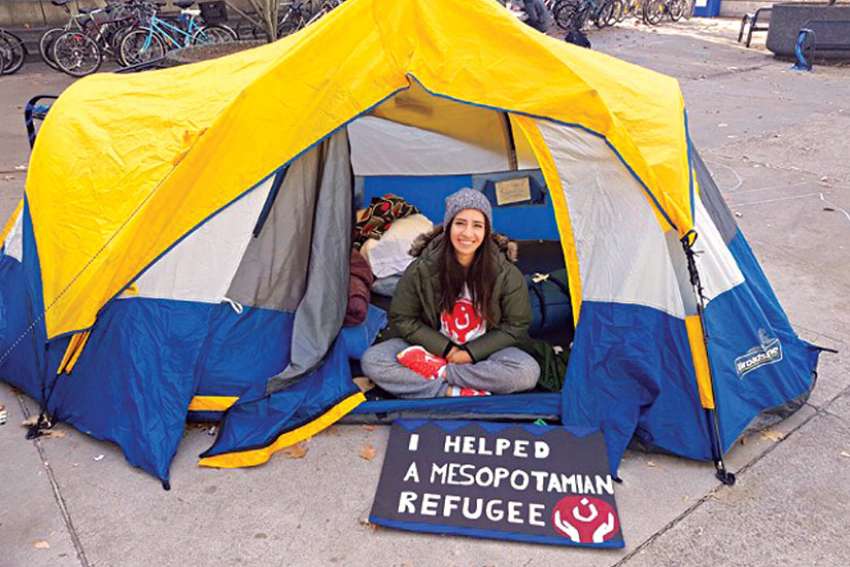My parents made the trek of leaving Iraq with nothing in their pockets. As we crossed a river, my mom cried because my sister and I were crying from hunger and she didn’t even have bread to feed us. Sometimes, I wonder if I was still stuck in that situation, would someone come to my aid?
Every day I see story after story of the refugee crisis. Citizens are being kicked out of their homes because they don’t have the same religious beliefs.
Death threats are being made against minorities, including Christians, if religious conversion did not take place. Being a refugee makes you vulnerable, helpless and wanting to seek aid.
More than 20 years later, I found myself reliving some that refugee life, but in a very different way.
From Nov. 14-17, I participated in an event called Life of a Mesopotamian Refugee. Students from the Assyrian Chaldean Syriac Student Union (ACSSU) wanted to reach two goals: to educate McMaster, Ryerson and York University students about refugees and to fundraise $30,000 to send to Iraq and Syria through the Catholic Near East Welfare Association (CNEWA).
This year is the third time I tried to emulate the life of a refugee today, placing strong emphasis on the word “tried.”
For one week I lived in a tent outside Ryerson University’s Student Centre. I was at the mercy of others for food and water. I barely used technology. I gave up showering and I became a beggar for any amount of monetary aid.
The temperatures dropped every night and every morning, so distractions from the weather were important.
Giving up showering symbolized giving up a luxury we take for granted, although I made sure not to get too close to others in those final days.
Begging was the most challenging because although every “yes” was a victory, every “I’m not interested” made me want to shake people by the shoulders and make them care.
Food was a scarce resource in the first couple of days due to lack of awareness.
Last year, there was a bigger push to help the refugees, with the Canadian government doubling the $28,000 we raised because of the Syrian refugee crisis. But this year, we noticed that students are not as engaged in the issue as much.
For me, to have to live like a refugee for a week was merely an inconvenience. I have no idea what a refugee in Iraq and Syria has to go through today.
The lives of these displaced families have been shaken to the core and they are surviving in conditions I will never understand. I don’t know how they feel because I don’t have to worry about ISIS. I don’t know their struggle of needing fresh water to drink as I was privileged with free fountains all over campus.
In my tent, I did not hear the sounds of crying children who were hungry or in pain. Most daunting of all was that my week did not consist of not knowing what the future holds and having absolutely no control in changing my fate for myself and for my family.
I did not live a life like theirs because after the event was over, we cleaned up our tent, packed our bags and went back home like nothing happened.
The hardest part of living in Canada is that I am so lucky for all I have that I forget about those living in turmoil. The least we can do is keep them in our prayers and make sure that they know that there are people who really care about them.
Even though we have packed up, the fundraising campaign will continue until Dec. 4. (www.youcaring.com/cnewa-680499).
(Dinkha, 25, is an alumnae member of the Assyrian Chaldean Syriac Student Union at McMaster University in Hamilton.)


